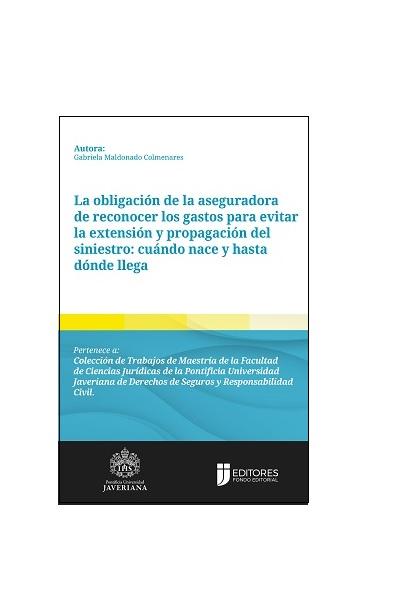Sin título DIRCOM-CONTENIDO-GENERICO - Ciencias Jurídicas
La obligación de la aseguradora de reconocer los gastos para evitar la extensión y propagación del siniestro: cuándo nace y hasta dónde llega

Autora: Gabriela Maldonado Colmenares
Director: Armando Gutiérrez Villalba
ISBN 978-631-302-021-8
Maestría en Derecho de Seguros y Responsabilidad Civil
Links de posteos de difusión en redes: Instagram LinkedIn
RESUMEN
El artículo 1074 del Código de Comercio es claro en señalar que la carga de evitar la extensión y propagación del siniestro, y la correspondiente obligación de la aseguradora de reconocer los gastos en que se incurra por razón del cumplimiento de aquella carga, surge cuando ha ocurrido el siniestro. No obstante, se ha discutido si, en el campo del seguro de responsabilidad civil, ello significa que dicho deber solo debe cumplirse cuando un tercero resulta damnificado o, si por el contrario, hay cabida a reconocer los gastos de aquellas medidas que se adopten ante la presencia de un suceso que tenga la virtualidad o potencialidad de generar daños a terceros, y que tienden a impedir que éstos se produzcan.
A través de este trabajo se pretende dar una solución a esa controversia en el sentido de que, a la luz de los principios y postulados del derecho que gobiernan la figura, y a través de un análisis dogmático de la misma, se justifica que la aseguradora reconozca los gastos en que incurra el asegurado para evitar un siniestro inminente o la disminución de su magnitud, así éste no se haya consumado en su totalidad, y por ejemplo, no haya causado daños a terceros. Una vez expuesto lo anterior, se analizará si el pago de esos gastos erosiona o no la suma asegurada, y si está sujeto al deducible pactado. Para llevar a cabo lo anterior se partirá del desarrollo que se le ha dado al postulado de la buena fe constitucional y la consagración normativa del principio de la buena fe en la legislación civil y comercial. Seguidamente, se profundizará en los estudios que existen en la materia sobre el deber de mitigar o reducir los daños en general, y en particular, en el contrato de seguros, a raíz de la consagración normativa de la carga para evitar la extensión y propagación del siniestro. Finalmente se hará un análisis sobre el significado del siniestro en nuestro ordenamiento y con ello se buscará responder las críticas que se han planteado sobre el asunto para así defender la idea de que la aseguradora de responsabilidad civil debe reconocer los gastos en que incurra un asegurado, ante la inminencia de causación de daños a terceros como consecuencia de un hecho imputable a aquel, no obstante no se hayan causado aquellos efectivamente o no se hayan presentado reclamaciones por los hechos acaecidos. Por último, se hará referencia a los límites cuantitativos que son aplicables a la obligación de la aseguradora de pagar o reembolsarle al asegurado los gastos en que incurrió para evitar la extensión y propagación del siniestro, a la luz de las normas del Código de Comercio.
ABSTRACT
Article 1074 of the Commercial Code states that the insured has the duty of preventing the spread and propagation of the loss, and the insurer the obligation to pay the expenses incurred by the insurer to achive that. This burden and obligation arises when the loss has occurred. Now, regarding the civil liability insurance the loss implies that a third party has been injured. Therefore, it has been discussed whether this means that the duty of mitigation must only be fulfilled when a third party has been injured or, on the contrary, if there is room to pay the expenses of measures adopted by the insured before the damages are caused but after an event that potentially could cause those damages has taken place. This work provides a solution to the controversy defending the idea that, in light of the principles of law, such as the duty to act in good faith, the insurer should reimburse the expenses incurred by the insured to avoid an imminent loss or decrease its magnitude, even if it has not been fully consummated, and for example, has not caused damages to third parties. Once the foregoing has been stated, I analice whether or not the payment of these expenses erodes the sum insured, and if it is subject to the agreed deductible. To carry out the above, first I will describe the constitutional duty to act in good faith and its application in civil and commercial legislation. Next, I will study in depth the duty to mitigate or reduce damages in general, and in particular, in the insurance contract. After, i will analyse the meaning of loss in the civil liability insurance to propose that it should de understood differently when article 1074 of the Commercial Code is applied. Finally, with this, I will seek to respond to the criticisms that have been raised against the idea that the civil liability insurer must pay the expenses incurred by an insured, given the imminence of causing damage to third parties as a result of an act for which he is liable, despite those have not been caused. At the end, I discuss what should be the quantitative limits applicable to the insurer's obligation, in light of the rules of the Commercial Code and the proposed meaning of the loss.
